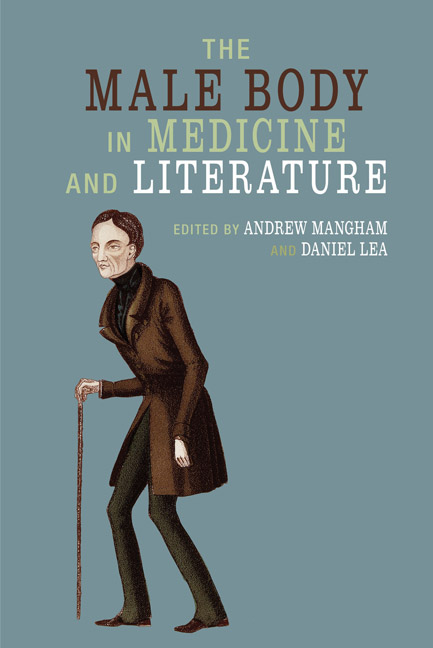Book contents
- Frontmatter
- Contents
- Acknowledgements
- Notes on Contributors
- Introduction
- Part One Enquiry and Experimentation
- Part Two Wounded and Psychopathologised Bodies
- Part Three Fear, Confusion and Contagion
- 9 ‘Sons of Belial’: Contaminated/Contaminating Victorian Male Bodies
- 10 Syphilis and Sociability: The Impolite Bodies of Two Gentlemen, James Boswell (1740–1795) and Sylas Neville (1741–1840)
- 11 ‘’Tis My Father's Fault’: Tristram Shandy and Paternal Imagination
- 12 Southern Gothic and the Queer Male Body
- Index
11 - ‘’Tis My Father's Fault’: Tristram Shandy and Paternal Imagination
from Part Three - Fear, Confusion and Contagion
- Frontmatter
- Contents
- Acknowledgements
- Notes on Contributors
- Introduction
- Part One Enquiry and Experimentation
- Part Two Wounded and Psychopathologised Bodies
- Part Three Fear, Confusion and Contagion
- 9 ‘Sons of Belial’: Contaminated/Contaminating Victorian Male Bodies
- 10 Syphilis and Sociability: The Impolite Bodies of Two Gentlemen, James Boswell (1740–1795) and Sylas Neville (1741–1840)
- 11 ‘’Tis My Father's Fault’: Tristram Shandy and Paternal Imagination
- 12 Southern Gothic and the Queer Male Body
- Index
Summary
The eighteenth-century dispute concerning a pregnant woman's potential to affect her foetus with her imagination is relatively well known. Keenly debated by physicians, midwives and even literary writers, the debate over ‘maternal imagination’ explored in minute detail the strength of a woman's mind and her ability to control it. However, this debate raised corresponding questions regarding the male role in sexual reproduction and the extent of paternal influence over both the parental nurturing and the individual nature of a child. This essay argues that Laurence Sterne tackles issues of paternity, masculinity and the male sexual role by drawing pointed attention to the obscure notion of paternal imagination in his novel The Life and Opinions of Tristram Shandy, Gentleman (1759–67). This text, widely acknowledged for the author's play with the complex intersections between eighteenth-century spheres of medicine and literature, employs the idea of paternal imagination to challenge eighteenth-century beliefs and assumptions regarding the male body.
Sterne presents a back-to-front model of paternal imagination in his novel to signal the damaging effects of the very idea of a father's private thoughts influencing the formation of his offspring. Unlike the common tales of a mother's monstrous imagination or medical theories regarding a father's positive imaginative influence, Tristram Shandy is the story of a child who is continually affected in a negative way by the father's belief in his own imagination. As this chapter will demonstrate, Sterne's tale of paternal imagination does not follow the typical model of a father's state of mind physiologically affecting the embryo, but is instead structured around the consequences of a father's faith in a specific notion of paternal authority. The novel's insistence upon a warped version of paternal imagination disturbs preconceived notions of a father's physical and mental contribution to reproduction and serves to highlight the importance of social responsibility as having more influence on a character's development.
Maternal and Paternal Imagination
A loosely assembled quasi-theory, the notion of paternal imagination usually expressed the idea that a man's thoughts and feelings at the point of his orgasm could affect any offspring produced by his ejaculation. Mental or physical similarities between a man and child were usually discussed in order to prove, or disprove, paternal responsibility.
- Type
- Chapter
- Information
- The Male Body in Medicine and Literature , pp. 194 - 220Publisher: Liverpool University PressPrint publication year: 2018

